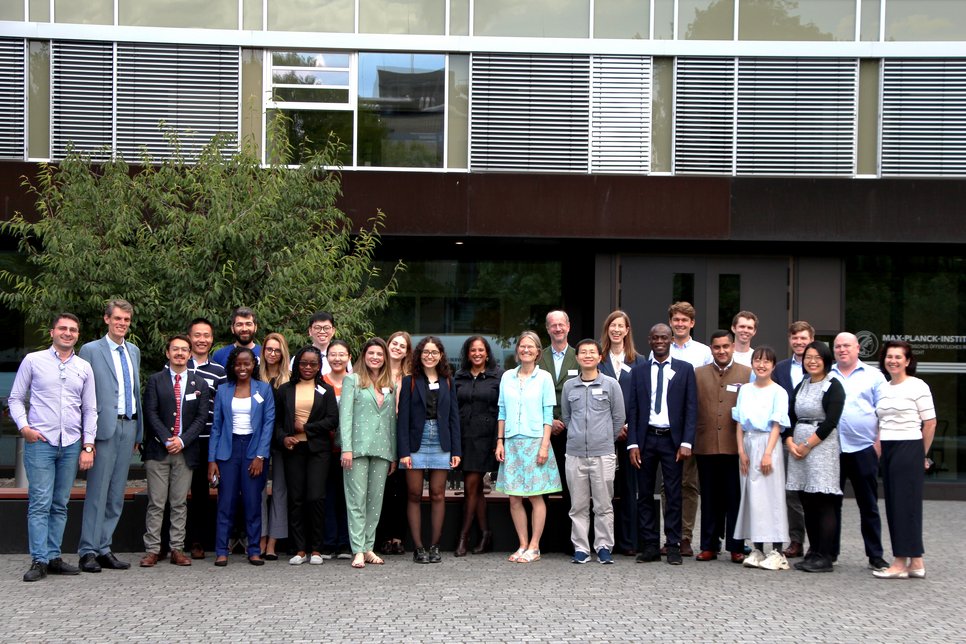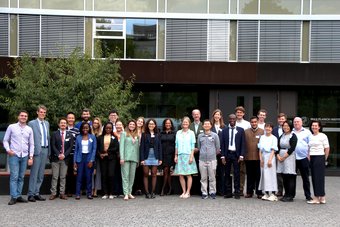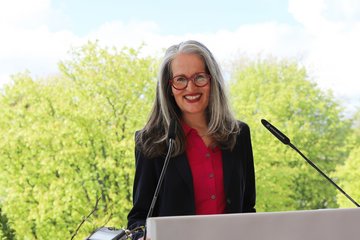Summer School „Populism and the New Foreign Relations Law“
The MPIL in Heidelberg hosted from 8 to 10 June 2022 a three-day Summer School titled “Populism and the New Foreign Relations Law: Between Public International Law, ‘External Public Law’, and Conflict of Laws”, led by Anne Peters (MPI Heidelberg), Karen Knop (University of Toronto and Max Planck Law Fellow), and Ralf Michaels (MPI Hamburg). The Summer School, which brought together 20 young scholars, was also the first step in a large-scale research project that Karen Knop will lead in the coming years as one of the first Max Planck Law Fellows.

The aim of the Summer School was to familiarize the participants with foreign relations law, a field which is known in only a few countries, and to examine its relationship to conflict of laws and international law. Led by the three hosts, the participants engaged in lively discussions on the presented topics, thus bringing together their diverse professional and national backgrounds. The results of the Summer School will not be published as such but will instead fuel and direct Karen Knop's larger research project as a Max Planck Law Fellow, an effort whose completion will require some years.
The Summer School began with the observation that few of the many nations represented identified foreign relations law as a distinct area of law. In Germany, one of the few countries having such a field of law, it is known as Staatsrecht III. From a comparative law perspective, however, it is difficult to define this new field of law in a general way. This also generates questions of whether such a field of law is needed at all or which particular issues it should govern, as the possible area of regulation is to a large extent covered by other areas of law, namely international law, conflict of laws, constitutional law, and administrative law as well as by the field of diplomacy. However, there is a variety of situations that cannot be assigned clearly to any of these established areas of law, thus highlighting the question if they should be assembled in a new field. Why, for instance, is the legality of a demonstration in front of an embassy often subjected to different rules and standards than other demonstrations? May South Korean “comfort women” compel the South Korean government to negotiate with Japan for compensation for their suffering during the war? Why is a claim for compensation for a death caused by the exercise of excessive police force dismissed when the fatal shooting occurred across an international border? Do such cases even fall under a court’s jurisdiction or is it rather a task of diplomacy to find a solution?
These and many other cases clearly show that there is room for a new field of law which should be explored with closer attention. However, the field’s further development should not – as has been the case so far – be left to a few Western countries; rather, the perspectives of other countries should also be included. Precisely this creation of new perspectives was one of the core aims of the Summer School. According to Karen Knop, the still young field of law is in danger of falling victim to populist politics. She understands populism not as an ideology but as a method for the demarcation and devaluation of all things “international” vis-à-vis what is deemed national. This concern is illustrated by the "take back control" slogan of the Brexit campaign, alleging that the EU institutions have little or no democratic legitimacy. The withdrawal from international treaties and organizations is a phenomenon that can, indeed, be observed in many countries. This dynamic should not be encouraged by foreign relations law through its establishment as a substitute for international law.
But are general concerns against international law as undemocratic justified or is the opposite the case? Case studies presented by Anne Peters illustrated how the ratification of international public law treaties – or the withdrawal from such treaties – may or may not be democratically legitimized. Can the executive of a state withdraw from the International Criminal Court without involving the legislative? Also, conflict of laws can offer new perspectives. Its openness to foreign legal systems or, to put it more abstractly, “to the foreign”, was introduced by Ralf Michaels as a tool against populist tendencies. Experiences from Brazil, the USA, and Canada, among others, also show that it is necessary to recognize non-state parties such as indigenous peoples. Even if not recognized under international law in the same manner as states, indigenous people regularly maintain relationships across state borders to one another and to other nation states. Karen Knop used the example of the Arctic Council, a body in which nation states and indigenous peoples from the polar region are represented, to highlight the growing relevance of non-state actors.
After three days filled with sessions, discussions, and lively conversations, the participants departed with the strong sense that the foundation for the further development of foreign relations law had been laid together. As a parting gift, the three hosts wished for a further development of the learned and encouraged the participants to publish the newly made findings. Given the many newly made contacts – woven diligently after the long break due to the Covid-19 pandemic – it is merely a question of time that co-authored publications will appear.



